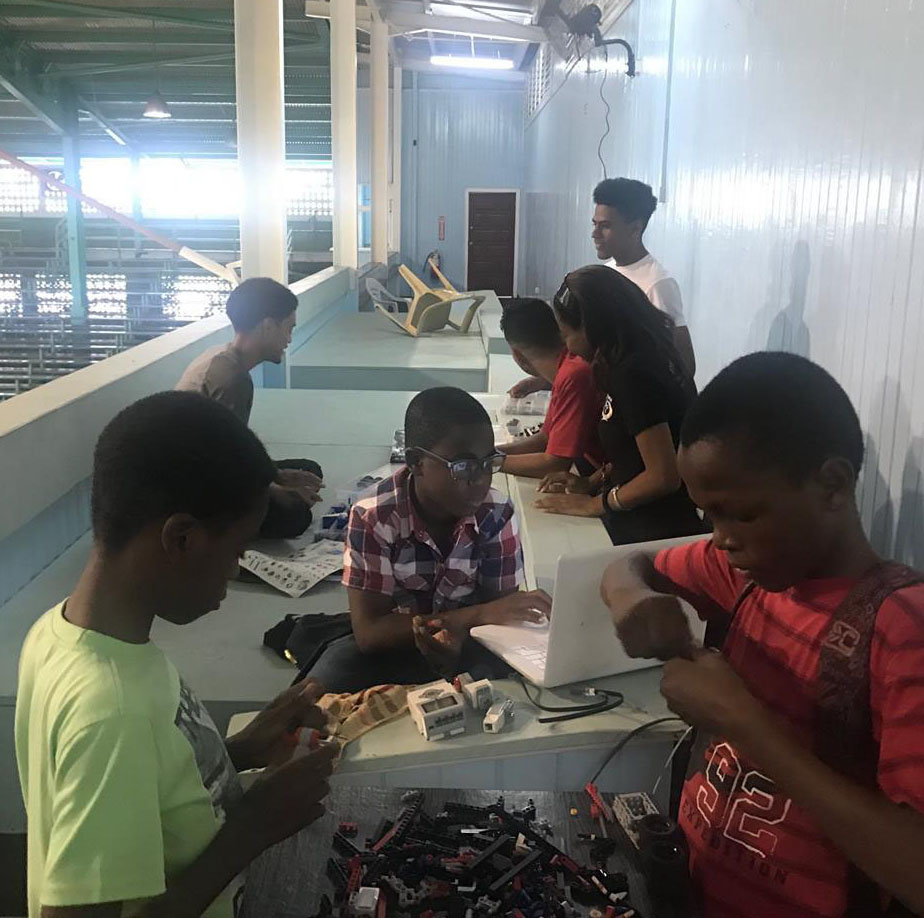By Karen Abrams, MBA
Co-Founder, STEMGuyana
The past few years have witnessed a significantly enhanced sensitivity among our young people, particularly school-age children, to the importance of information technology as an educational tool that will serve our country’s developmental mission. Young people have moved from a position of curiosity in relation to the wonders of information technology and what it can accomplish to familiarizing themselves with skills such as Coding, the discipline that enables the creation of computer software, apps and websites and might even allow those who master the discipline to create their own technology businesses. Critically, a knowledge of Coding enables an understanding of the technology that shapes the environment in which we live.
For the time being, however, the interest in Coding has to do with preparation for participation in a national competition designed to raise awareness of information technology to unprecedented levels amongst our young people. Truth be told, there is, these days, no more important a mission for Guyana’s education system than that of significantly raising its game insofar as the quality of education it delivers is concerned.
Current research points to the high likelihood that 65% of primary -age pupils will work at jobs that are yet to be invented. Experts are also estimating that in the not too distant future robots could replace 800 million jobs worldwide. Other studies point to the likelihood that 70% of the jobs that exist today will be affected to varying degrees by artificial intelligence and automation.
Young Guyanese, therefore, can anticipate a future that is heavily influenced by robots, artificial intelligence and automation, Accordingly, their knowledge-acquisition priority must be to condition their minds for any number of possibilities as far as the technological future is concerned.
What this means, frankly, is that the contemporary learning experience cannot afford to exclude subjects like mathematics and science from their curricula. Rapid global change compels stakeholders in the Guyana education system- parents, teachers, educational institutions and policy-makers to re-imagine and afterwards re-shape the curriculum. It is either that or risk sacrificing the developmental future of our country.
Guyana is not alone in this quest. Across the globe, developed and developing countries are busying themselves preparing their young people for a version/vision of the future that is shaped and driven by technology. Educators from developed and developing countries are currently engaged in the process of creating and rolling technology programmes that will be placed at the disposal of the academic community. In Kerala, India, stakeholders recently trained 60,000 ‘young ambassadors’ in Scratch Programming and Computational Thinking. Those who benefit from the training are expected to influence a further one million of their counterparts. In Africa, too, educators are exposing students to ‘fun technology’ tools in order to strengthen their critical thinking and problem – solving skills and heighten their curiosity about the possibilities that inhere in STEM-related careers.
In Guyana, an initiative driven by local public and private sector stakeholders is seeking to significantly raise the national technology ‘game.’ Up until now the most encouraging outcome of this initiative has been the spontaneous and widespread response of the young people, including children from across the country. One of the outcomes of this initiative is the planned launch of two competitive National Technology Leagues that will target local primary and secondary schools. The two leagues will organize annual Scratch Coding and Lego Robotics Competitions. Additionally, Guyanese students will be introduced to programmes aimed at imparting coding skills, computational thinking, and logical reasoning while affording them an invaluable opportunity to exercise their creative skills and innovative talents. Fifty coaches have already been trained and several students are already learning to code using MIT Scratch programming.
The Leagues will organize participants in competitions among NDCs following which national winners will be declared. Additionally, the League will disclose weekly Challenges created by the Ministry of Education that are linked to the current Science and Social Studies curricula. Students across Guyana with internet access (and here we are fervently hoping for a significant speedup of countrywide internet access) will work on-line as they seek to advance their teams to the nationals.
Currently, only two other countries – Ireland and Qatar have implemented national Coding Leagues. In a short while Guyana will become the third country in the world to have introduced a national technology programme of this kind.
Winners of these competitions will get an opportunity to represent Guyana at the Caribbean National Scratch Programming Championships scheduled for December, 2018. Participants are expected not only to benefit academically but also to put their innovative and creative proficiencies to work in developing their coding and other technical skills.
Between February 1st and 3rd, this year, more than 50 potential STEM club coaches representing nearly twenty-four teams were trained in the areas of Robot – Building and Scratch Programming as part of an initiative to launch an accelerated culture of innovativeness. Additionally, more than twenty teams representing the various administrative regions will participate in the pilot programme. We are particularly heartened by the fact that Bartica has sent 13 to be trained, and will have two secondary schools represented in the competition. All secondary schools in Guyana have been invited to participate in the upcoming pilot run of the competition.
On Saturday February 24 the League hosted its final Seminar prior to the start of the competition.
The league registration form can be found on the STEMGuyana website (www.stemguyana.com) or Facebook page.





